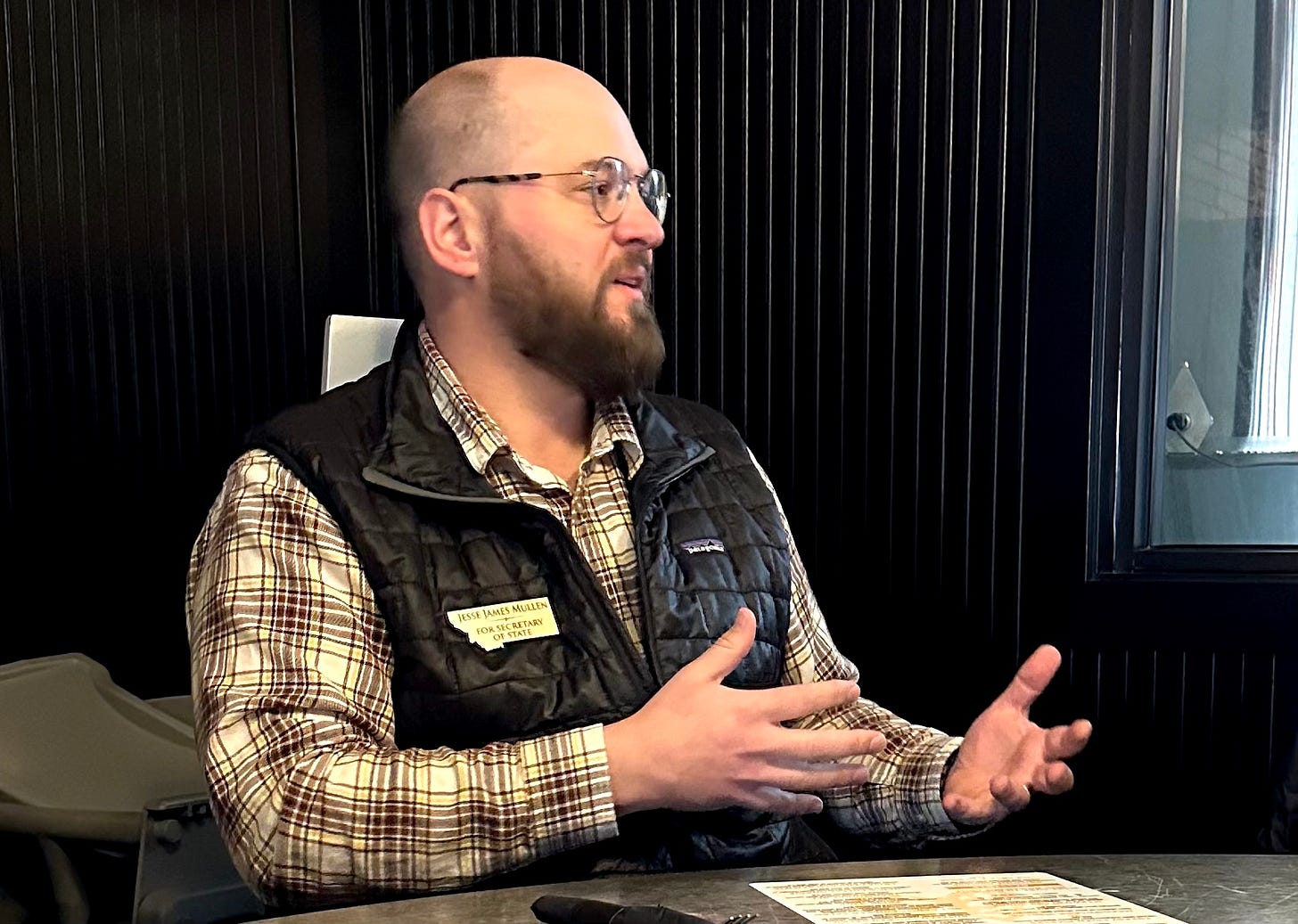Jesse James Mullen's blunt, hopeful campaign for Secretary of State
Plus: A roundup of terrific new music from across Montana.
Welcome to Big Sky Chat House— a newsletter of candid conversations with movers and shakers in Montana.
If you found this email in your Promotions folder, please move it to your Primary inbox. That will make it easier to find down the road, and teach Gmail to send it to other subscribers’ Primary inboxes as well.
Since he launched his campaign for Montana Secretary of State last September, the newspaper and bookstore owner Jesse James Mullen has run a dogged race against his opponent, Republican incumbent Christi Jacobsen.
The Secretary of State handles a wide range of duties, from overseeing state elections and Montana’s citizen-led ballot initiative process to handling public records requests and managing business services. Mullen has criticized Jacobsen’s record on many of these fronts, and accused her of “total incompetence.”
The race marks Mullen’s second campaign for public office. He spent two decades in media—and now owns the Mullen Newspaper Company—before running, unsuccessfully, in a special state Senate race in 2022.
Mullen’s run for SoS comes at a charged moment in the history of the office. It coincides with both a deep distrust in the electoral process and a growing sense—illuminated by the dizzying back-and-forth legal dust-up this spring over the viability of a voter initiative to fortify abortion rights—of the enormous influence that the Secretary of State wields in electoral matters.
Read along as Mullen walks us through what he considers the “damage” Jacobsen has done to Montana, points of friction with the Democratic Party, his take on a new left-wing PAC-funded publication in Montana and more.
Max: As Secretary of State, how could you gain back voters' trust in the electoral process?
Jesse James Mullen: There are two keys. The first is a radical degree of transparency. As somebody who has been on the requesting end quite frequently, I think it's important to have mechanisms in our public offices to accommodate public requests for information, and that they are fulfilled quickly; to make sure that Montanans’ Right to Know is accessible, affordable, and can be done in a rapid manner.
The other key is just being consistent and doing the job accurately; not creating a lot of undue drama or undermining our credibility. It's not an overnight fix. In a best-case scenario, I’m in that office for eight years. And if I can even come halfway back to where we were seven years ago when [Linda] McCulloch was still in office, that would be a massive success. It's impossible to repair all of the damage that's been done by Christi Jacobsen and [former Secretary of State] Corey Stapleton in just a few years.
What would you consider some examples of that damage?
I would direct your readers, first and foremost, to Christi’s lack of defense for county Clerk and Recorders. We have a State Attorney general [Austin Knudsen] who has on multiple occasions written letters and sent out information that directly undermines the credibility of our Clerk and Recorders while our Secretary of State fails utterly to defend them. Her silence condones that behavior from Austin Knudsen.
In addition, we have a Secretary of State who is frequently in the court system defending her refusal to do her job, to perform her constitutional duties.
She racked up $1.3 million in legal bills in just her first two years in office, trying to defend herself in court for not doing her job. That's public money. And she's losing all of these cases.
Most recently she was almost held in contempt for refusing to turn over documents to start the signature collection process on the abortion rights ballot initiative.
We have to have people in public office who understand what accountability actually means. My opponent over the past few years has purposely sent out misinformation. She sent news releases and advertisements to newspapers and radio stations with outright falsehoods regarding whether or not it's illegal to register to vote on Election Day. That office is supposed to be apolitical.
What would you consider Montanans’ top concerns pertaining to this race? What do you hear from constituents?
There's the specific duties of the office: people want to see competency from our Secretary of State. They want a business services office that runs well, where business owners don't have to blow a day or two troubleshooting with our Secretary of State's office.
But that's not really what I hear the most about. What concerns most Montanans is the over-politicization of these offices. Right now, the politicians, whether they're in Helena or DC, are putting their parties ahead of doing their jobs. And I'm sick of it. Everybody else is, too.
I recently interviewed Democratic state House candidate Dakota Adams, who argued that Democrats sometimes try to pitch themselves as being, simply, “not Republican.” What do you make of that?
Sometimes I'll see one of my signs in a yard that also has a Trump flag up. Most people want to elect somebody who cares about the same things that they care about. And what most Montanans care about is their neighbors and their communities and their children and grandchildren. And if you can show them that you do care about those things, and you will advocate for them in that way, you'll still gain their support. But you have to put in the time and effort to show them that you will work for them.
It's almost taken as common knowledge within Democratic circles that you're not supposed to [reach out to] Trump voters, that it's not worth your time.
I hear this all the time; they clearly don't understand why people voted for him. It's not because of racism that people voted for him. They saw somebody who could change a system that, regardless of whether you were a Democrat or a Republican, was not working for them.
You’ve said online that a tenet of your campaign is pushing for easier access to the ballot initiative process. What does that look like, in concrete terms?
I can't speak too much to it because it’s [ongoing]; there's this group called Giddy Up that are looking at making some changes to overturn what I would view, and they view, as [policies] handicapping the public's access to the ballot initiative process. I think that our Secretary of State has a bit too much control and say over what can and cannot be transferred [to voters].
There's the current push by Secretary Jacobsen and then the legislature to voice their opinion on women's access to healthcare and the abortion ballot initiative. I don't give a hoot what the legislature thinks about that initiative. The wording is pretty clear; let the public decide.
Are you operating your newspaper company during your campaign?
I stepped down as CEO of the company last summer, in order to remove myself from any editorial decision-making, specifically. I still do own the [business].
As a former journalist, how do you see the relationship between politicians and the press, now that you’re on the other side of the looking glass?
You spend twenty years in journalism and you get the idea that it's pretty cynical; you tend to believe that everybody running for office is just in it for themselves; that it's all ego and personal ambition. Over this last year and a half, I've come to realize that it's ten times worse than I ever thought.
There's a real misunderstanding among people in politics what the role of the press is. You see it all the time with complaints that a journalist isn't covering the story the way the Party wants them to. That's not their job. They have a job to do, and that's to tell these stories in a way that most people can understand so they can make informed decisions on their own. And that doesn't necessarily always work with the ambitions of a Party.
Can you give me an example of that friction?
I had a post a couple of weeks ago where I was talking about the lack of an endorsement from a certain group [the MFPE]. There had been some behind-the-scenes conversations to get in line or it's something I could lose.
Montana Free Press recently ran a story about a new publication called the Montana Independent, which is funded by a progressive dark money group. Have you come across it, and if so, do you have a take on it?
I don't like it. A lot of people who support my campaign do like it. They like it quite a bit because it's their mission to get progressive politicians elected. I understand the appeal. The Republican Party's been doing that for a long time, especially with websites.
But it undermines all of our credibility. If you want to anger every editor in the state, go ahead and start up a fake newspaper and pretend that it's anything other than an ad.
I haven't received a copy at home, but I've seen the pictures online. It'd be nice if we had some laws in place so that, if you're going to put something out that is, in my opinion, misleading, that it should be clearly marked that it is not unbiased journalism.
Jesse, is there anything you want to add before we wrap up?
I own businesses that are often a hundred-plus years old. If I do my job well, they'll be here for another hundred years. I am a caretaker for these newspapers. I might own them right now, but ultimately, they belong to the communities they serve. I am the caretaker.
Our state executive positions need to be treated in the same manner. My goal is to get in there, do the job well, and leave it better than I found it.
This conversation has been edited for length and clarity.
One more thing…
I had a lot of fun putting together this list of terrific new songs from Montana artists forThe Pulp. From indie-rock and mariachi-inflected country to disco, death metal and ambient folk soundscapes, there’s something here for most everyone.




Good article, thanks.